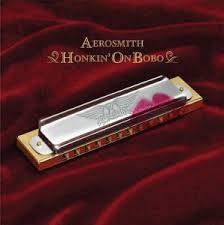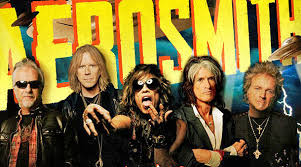Joe Perry (2004)
“It’s never easy to make a record.”
March 19, 2004
On the road between Hot Springs and Little Rock, Arkansas, one week into Aerosmith’s Honkin’ On Bobo tour
After years of talking about it, Aerosmith finally made good in 2004 on its promise to record a blues album. Nobody was more excited about it than the band’s guitarist, Joe Perry.
“Honkin’ on Bobo” released on March 30, 2004, contained 11 covers – not all blues, but mostly – and one original. It was the first Aerosmith album since 2001’s “Just Push Play” and, aside from “Rockin’ the Joint,” a forgettable 2005 live album, it would be their last until “Music from Another Dimension” in 2012. That’s only two albums of new material in 12 years, which says something about the personal and professional difficulties the band experienced in the 21st century. No matter, Aerosmith endures. Last week the band was forced to cancel a concert in Istanbul because of a national day of mourning for the victims of the Soma mining disaster, and launched its Let Rock Rule World Tour 2014 in Sofia, Bulgaria, instead. Next up (as I write this on May 19, 2014): a show in Vilnius, Lithuania, after which the band travels to Russia for dates in Moscow and St. Petersburg.
I hope they invited Pussy Riot.
How are you Joe? What have you been doing today?
We just stopped at Bill Clinton’s favorite rib place. McClard’s ribs [in Hot Springs]. He’s got great taste in ribs.
Are you performing tunes from the new CD [“Honkin’ On Bobo”] on this tour?
Right now we’re doing four songs in the set. We’ve been doing two all along all through the [2003 joint] Kiss tour. One we’ve been playing for almost 10 years, “Stop Messin’ [Around].” So last tour we were doing “Baby Please Don’t Go” and “Stop Messin’.” Now we’re doing “Roadrunner” and “Never Loved A Woman,” both of which are going down real well. Some of the audience recognizes the Aretha song, so they kinda know it. “Roadrunner,” they’ve really been applauding a lot for it. It’s blowing my mind. Once the records out, we’ll start adding more. So far just the response from radio on “Baby Please Don’t Go” has been so positive, so fast. I haven’t seen the numbers in the last few days, but it’s been doing really well. It feels really good. We haven’t had a song like this hit rock radio for a long time.
[In case you’re keeping score, “Baby Please Don’t Go” made it to No. 7 on Billboard’s Hot Mainstream Rock chart, hardly a triumph by Aerosmith standards. Ditto for “Honkin’ on Bobo,” though it sold impressively for a blues album, rising to No. 5 on the Top 200 and eventually reaching gold record status (more than 500,000 copies sold)].
Was it ever your intention to do a totally traditional blues CD?
I think that’s why we kept putting it off. The last time we thought seriously about doing it was when we were working on [1993’s] “Get A Grip.” We were in the throes of writing that record and that ended up having three or four huge singles. It was one of our biggest albums. The point is we were writing that record and didn’t see any point in doing a blues record. But it was in the back of our minds. Then, when we had a little time between the Just Push Play tour and the Kiss tour, we thought maybe now’s the time to do something with this idea. We had all been talking about and thinking about it. And then we started to realize, when I thought about some of the blues songs we have played, it’s not just the traditional I-IV-V 12-bar thing. You have songs like “Train Kept A Rollin’” and “Big Ten Inch Record.” We thought maybe we can have some fun with this. We started getting in the studio and playing.
How did you select what songs to do?
We all did some research. For myself, I’ve been immersed in it the last three years. It went hand in hand with traveling on the bus again and being in touch with the road, listening to a lot more local radio, spending a lot of time down South, going through towns where the blues were made famous, spending time in Memphis. For me, that was part of my arrival at this record. Everyone else had their own homework, spending time on the bus listening to the songs, the compilation CDs, reading about this stuff, finally coming up with a short list of about 20 songs that I thought would be fun to do. There are so many blues out there and so many places you can take it. Look at “Big Ten Inch Record.” It’s a kind of Bull Moose Jackson swing song. The version of “Train Kept A-Rollin’” the Yardbirds kinda borrowed was from the [Johnny] Burnette trio which got it from Tiny Bradshaw. And that was a real big band swing song. It’s funny to hear those background vocals and all those riffs. The only thing that wasn’t there was the guitar, everything else was right off the Tiny Bradshaw record. Hearing the originals of a lot of blues songs that we know and love from the Yardbirds and Stones and Fleetwood Mac and relistening to all that stuff kinda reset my thinking about where we should go with the record. We would just get down in the basement with a bunch of CDs and play ’em. We’d go, “Wow, I like this one, I like that one.” Then we’d just go in the studio and start playing. We’d try to figure out the lyrics and sometimes we got ‘em close, sometimes we didn’t. We got some stuff off the internet. If there was a particular song we wanted to get, there’d be two or three people’s different interpretations. We would just get down in the studio [in Perry’s home in Duxbury, south of Boston] and start playing. We were down in the basement room elbow to elbow, just working stuff out. Sometimes we’d drop it after a couple of hours, sometimes we’d roll tape by the end of the day.
You do “You Gotta Move” [written by Rev. Gary Davis and Fred McDowell, covered most famously by the Rolling Stones on “Sticky Fingers”] with some new lyrics added by Steven [Tyler].
Oh yeah. That’s in the grand tradition of the blues. That’s what he did. What we all do. With Steven, it was the lyrics and vocals. He didn’t stray off too much, but sometimes you have to because you can’t really figure out what they’re saying. Other times you put in something that’s a little more timely. That’s what a lot of songs were. You listen to someone else’s version and you change it. God, I mean everybody who covers a blues songs has done something to change it around. The only difference is that we gave credit to the people we borrowed it from rather than throw our name under the song title because we changed a few lines. It was a good way to give some credit back.
Who’s the biggest blues fan in the band?
People have different attachments to it. Not everybody is into it as much as I am, but everybody loves and respects it, no doubt about it. I know Joey [Kramer] is more into r&b and funk. But everybody has an attachment to it on some level.
You also do “Back Back Train,” another song by Fred McDowell. Is he a special favorite?
It just happened that way. We could have done a whole record of Slim Harpo songs or Willie Dixon songs very easily, just the way Eric Clapton just did a whole record of Robert Johnson. There’s so much stuff. So it just happened that way. Fred McDowell is one of my favorite blues players of that real traditional style. I can see him in the juke joint on his own pounding it out, getting the people dancing. But there wasn’t any particular reason.
You have a few guests on the record, in particular Johnnie Johnson [the late great pianist, best known for his work with Chuck Berry].
We really wanted to keep the guest list short on this record. It was suggested we might want to bring in someone like Buddy Guy, but we didn’t want to make it a traditional blues outing, we wanted to make it homegrown. One day I was reading in the paper that Johnnie was playing at the House of Blues. I started thinking we had a couple of songs that could really use his piano on there. So we made some calls and before we knew it John was in a car and on his way to my house. That bent the rules a little bit, I have to say, but it was in a way the just seemed right and natural. He was in town and he was gracious enough to come down and play for a few hours. It worked really well. It was awesome to have him in the studio and talk to him. And it was a way to not simply do the classic blues thing. He is known for his rock playing really, even though he says he’s a jazz guy.
Another guest is [Boston musician] Tracy Bonham.
With Tracy, she sent us a CD of her covering [Led Zeppelin’s] “Black Dog” with just her voice and violin. It was amazing. She was in town and came and sat in. I thought she really hit the nail on the head on the couple of songs she sang on.
I understand that you recorded the album in your studio, except for the vocals, which were done at Steven’s.
No, it wasn’t that way. Almost 90 percent of the vocals were recorded at my house. Everything was live. If there were additional things that we had to redo for technical reasons…for instance, we had to re-sing a few things because of all the leakage into the vocal mike. We were so tight in the studio that all this stuff was leaking into Steven’s vocal mike. So if we wanted to turn up his vocals you’d get drums and a lot of other stuff. For that reason, we had to re-sing a couple of things. And then he rewrote some lyrics. He rewrote lyrics to “The Grind.” But that was it. Everything else was recorded live in the room with us. That was why the record came out the way it did, because we were able to listen to each other play our final performances. It wasn’t like Joey had to imagine where the vocals would go, what the lyrics would be or what my final guitar part would sound like. It was all finished. So when we were playing it, it was all about getting performances. If you were in the room, that’s what you’d be hearing on the record.
Did playing together as a band this way make it easier to make this record?
It’s never easy to make a record. You’d think that this would be an easy one to make, but in some ways it was harder. There was more of an emotional attachment in some ways to the way it should sound then when we’re writing our own stuff. There’s no right or wrong when you’re doing your own stuff. But with this, I never realized I could disagree with Steven so much over so many things trying to get to the same place. But it just shows how much we had invested in making this record right, y’know?
A big surprise was hearing you cover an Aretha song [“Never Loved A Man,” redone by Aerosmith as “Never Loved A Girl.”]
It was just one of those days. I heard it upstairs on this compilation and just brought it downstairs. We had talked about doing a cover record, like John Lennon’s “Rock ‘n’ Roll,” at some time or another. So a song like that you’d hear someplace and look at each other and say, “Wow, wouldn’t that be a great one to cover?” So when I played it downstairs, I said, “What do you think? Let’s try to take this one on.” It’s really tough when you try to cover a song that’s so identified with a great singer like Aretha Franklin, the one and only. It’s pretty ballsy. But I gotta say, Steven amazed all of us.
“Jesus Is On the Mainline” might be an even more unlikely choice.
I had this Fred McDowell record that I was listening to, it had that song on it. I gave the record to Steven and [producer] Jack [Douglas] because they wanted to listen to “Back Back Train.” So after that he heard “Jesus Is On the Mainline” and he said we should all get in the room and try a foot stomping version of that. It was one of the last things we did last spring before we hit the road with Kiss. We all went into Steven’s studio. It was the night we had Tracy there. We had Steven’s daughter there and my son Tony’s girlfriend and we all just hooted and hollered and there it is. It was one of those songs that was fun to do that we thought might end up as a B-side. Then when we mixed it and put a little time in it and Marti Frederiksen brought it up sonically so you could really hear what was going on, it all of a sudden turned into an album track.
“Baby Please Don’t Go” sounds like you took a Yardbirds’ approach.
Having two lead guitar players has always been the thing that separated us musically from other bands. What we’ve shot for with Aerosmith is to take where the Yardbirds were going and never were around long enough to keep on developing. We’ve stayed with it and I think that’s one of our hallmarks. We definitely took some cues from the Them [with Van Morrison] version, but we really wanted to take it to a new level. Sometimes we think about things like that. If the Yardbirds were together maybe this is what they would sound like. But then that’s what Aerosmith is. Funny how that works.
Did Brad [Whitford] play many leads?
He did on “You Gotta Move.” He did some really great lead work on that. “Baby Please Don’t Go,” it’s not about the so-called lead guitar work, it’s about how the two guitars work together. If you want to get technical and go by the book, I play the leads, but they’re only compliments to the rhythm part. Playing leads is not what this band is about. It’s all about creating an overall sonic explosion. The two guitars work together.
Do you think Brad’s contribution to the band gets overlooked?
I think that happens. I think there are times, especially when people want to label things, that lead and rhythm guitar are not applicable. We probably owe more to [early] Fleetwood Mac as far as two or three guitar players working together than some of these other bands. They were a big influence on me, watching how the two guitar players work together, even though we were a lot heavier.
How did you come to decide to include one original, “The Grind”. It just seemed to fit. And it was done. Steven felt like he needed to change a couple of lines on it, but it was a song that we had on deck. We actually recorded three or four other original tunes, but we just didn’t have time to finish ’em. We didn’t want to have to hold the record up for them.
How’d you come up with the title? Where does “Honkin’ On Bobo” come from?
It’s an old blues or jazz expression or something. We’re not sure where it’s from. I’m not even sure where Steven heard it. He just came in and he said something about honkin’ about bobo and we all had a laugh and said, great, that would be a good working title for the record. When it actually came time to name the record, we were having a hard time finding something that would beat it. Then we heard that there were some complaints about it. That made it even more attractive.
[UrbanDictionary.com defines “honkin’ on bobo” as “The act of performing oral sex on a male (sic) penis.”]


